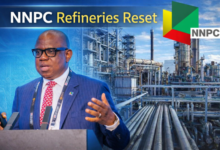Africa needs homegrown development solutions to transform – AfDB
 The African Development Bank (AfDB), says homegrown development solutions are key to unlocking Africa’s economic potential and achieving meaningful structural transformation.
The African Development Bank (AfDB), says homegrown development solutions are key to unlocking Africa’s economic potential and achieving meaningful structural transformation.
The AfDB’s Vice-President for Economic Governance and Knowledge Management, Prof. Kevin Urama told the News Agency of Nigeria (NAN) that Africa must look inward for solutions to its persistent challenges.
Urama, the bank’s Chief Economist, listed some of the prominent challenges bedeviling the continent to include inflation, currency volatility, debt sustainability, and food and energy insecurity among others.
He said the bank in collaboration with the Economic Commission for Africa (ECA), and the United Nations Development Programme (UNDP), recently hosted the African Economic Conference (AEC) to discuss strategies for securing Africa’s economic future amid global uncertainties.
Adesina lists opportunities, paths to Africa’s transformation
The professor acknowledged the growing multi- polarity in the global economy and the continued global shocks that have adversely impacted African economies, causing growth to fluctuate unpredictably.
According to him, international institutions like the World Bank and AfDB have invested billions of dollars in Africa, yet poverty continues to rise, and structural transformation remains slow and uneven across the continent.
Urama said that the global economic architecture, which often left African economies disadvantaged, must be re-assessed.
He emphasised the importance for African nations to adopt homegrown development solutions and policies that prioritised local solutions over foreign dependence.
“We must focus on what Africa can do internally to address our challenges and create sustainable growth.
“The continent should move away from exporting raw materials, a practice rooted in its colonial past, and instead focus on adding value to these resources locally,’’ he said.
Urama called for local content policies, franchising, and preferred procurement strategies that would attract the necessary capital and build industries within Africa.
“We can add value to our raw materials at home and create jobs, while also driving technological advancements, especially for our youth and women.
“For example, establishing a precursor factory for lithium-ion batteries in the Republic of Congo is three times cheaper than doing the same in the United States, given that the raw materials are located in Africa.
“This reduces logistics costs and helps cut down on carbon emissions, “he said.
The professor emphasised that such initiatives would not only benefit Africa’s economy but also present a win-win situation for international investors.
He said by establishing industries within Africa, companies would save on transport costs while also benefiting from Africa’s vast natural resources and untapped potential for economic growth.
“As Africa seeks to secure its economic future, the AfDB continues to advocate policies that harness the continent’s human, natural, and social capital.
“It is time for Africa to rethink its development approach; focus on our own resources, skills, and capabilities to transform our economies; create jobs, and reduce poverty across the continent.”












